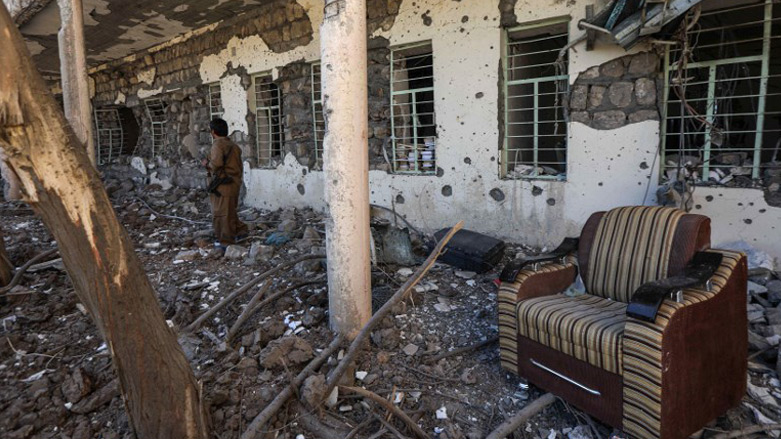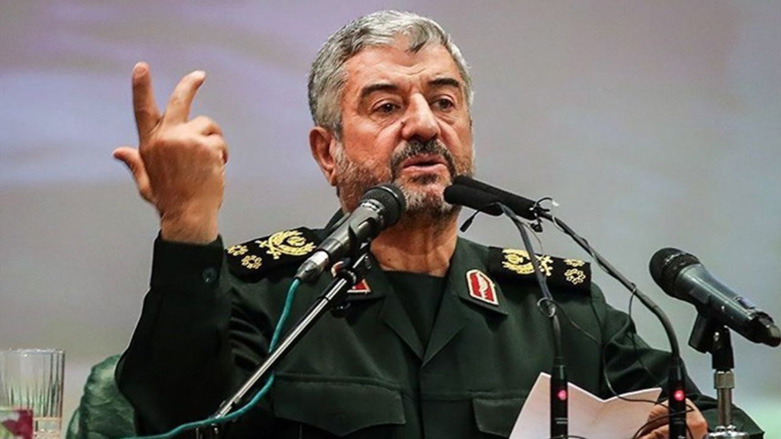White House warns Iran on proxy rocket attacks, while Iran charges US responsible for instability

WASHINGTON DC (Kurdistan 24) - The White House warned Iran on Tuesday it would hold Tehran responsible for attacks against US targets in Iraq that are carried out by Shia militias.
The US warning came after three mortars fell overnight last Thursday on Baghdad’s heavily-fortified “Green Zone,” where the US embassy is located.
An Iraqi statement claimed the mortars landed on an “abandoned lot,” but resulted in “no casualties or physical damage.”
A security source inside the Green Zone, however, told Reuters that the shells fell near the Egyptian embassy.
Asa’ib Ahl al-Haq, the militia headed by Qais al-Khazali, who was detained for attacking US troops during Operation Iraqi Freedom, claimed credit for Thursday’s attack.
In 2007 and 2008, rockets fired at the Green Zone caused multiple, repeated fatalities.
Thursday’s mortar attack was followed on Saturday by another assault in which three Katyusha rockets were fired on Basra International Airport, where the US Consulate is located.
No party claimed responsibility for that attack.
Responding to the two assaults, the White House, on Tuesday, issued a statement, denouncing the “life-threatening attacks in Iraq, including on the United States consulate in Basra and against the American embassy in Baghdad.”
The White House also said it would “hold the regime in Tehran accountable for any attack that results in injury to our personnel” or damage to US government facilities.
“America will respond swiftly and decisively in defense of American lives,” the statement concluded.
The clear articulation of Iranian responsibility for attacks carried out by the Iraqi militias represents a return to an earlier US view, embraced in the 1980s by the Reagan administration, or so Paul Davis, a former Pentagon analyst and currently a Senior Fellow at Soran University, remarked to Kurdistan 24.
“That was how we once understood terrorism,” Davis said. After any major attack, we had a “short list” of suspects: terrorist states and “the debate revolved around which of them had been responsible.”
There was a real prospect of determining which party was behind the attack, of US retaliation, and, therefore, of deterrence, Davis explained.
A retired US intelligence official concurred. He blamed Bill Clinton for transforming the US understanding of terrorism from a national security issue, involving enemy states, to a law enforcement issue, focused on the arrest, trial, and conviction of individual perpetrators.
Entifadh Qanbar, an Iraqi-American and head of the Future Foundation in Washington, applauded the White House statement.
The militia attacks on US targets would not have been carried out, except under “direct orders” from Qasim Soleimani, head of the Quds Force of Iran’s Islamic Revolutionary Guard Corps, Qanbar told Kurdistan 24.
“The only way to stop Iran,” he said, “is to hold Iran accountable.”
On Wednesday, Iran responded to the White House warning. Foreign Ministry Spokesman, Bahram Qassemi, denounced the US statement as “invalid, astonishing, provocative and irresponsible,” and charged that US “policies toward Iraq have led to nothing but insecurity and instability.”
Notably, Tehran’s initial response to the White House statement contained no counter-threat.
The Trump administration is apparently moving to correct a similar misunderstanding in regard to Afghanistan, revolving around Pakistani support for the Taliban.
The Afghan government has long charged that ending Pakistani support for the Taliban was key to defeating the terror organization. Earlier this month, the Pentagon announced it would cut $300 million in aid to Pakistan, because of its failure to act against extremist groups.
Zalmay Khalilzad, US ambassador to Afghanistan (2003-2005) and Iraq (2005-2007), where he was—and remains—quite friendly to the Kurds, shares that view, which he discussed in his memoirs, The Envoy.
Khalilzad explained that already in the mid-1990s, Pakistani intelligence had begun “funding, supplying, and training” the Taliban, and he expressed his frustration with the failure of the George W. Bush administration, in which he served, to acknowledge Pakistan’s role in supporting the Taliban.
Khalilzad has recently been named special advisor to Secretary of State Mike Pompeo on Afghanistan.
The New York Times, on Wednesday, citing anonymous US Defense Department officials, suggested that any US retaliation for Iranian proxy strikes “could provoke” attacks against US military personnel and civilians by Iranian proxies elsewhere.”
However, it may be worth noting that Iran’s response, at least initially, was relatively mild, while the risk of Iranian proxy strikes against US targets exists in any case. That was, in fact, what prompted the White House warning.
Editing by Nadia Riva

